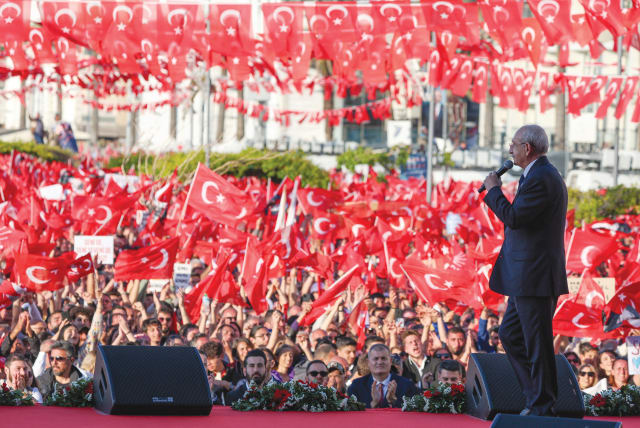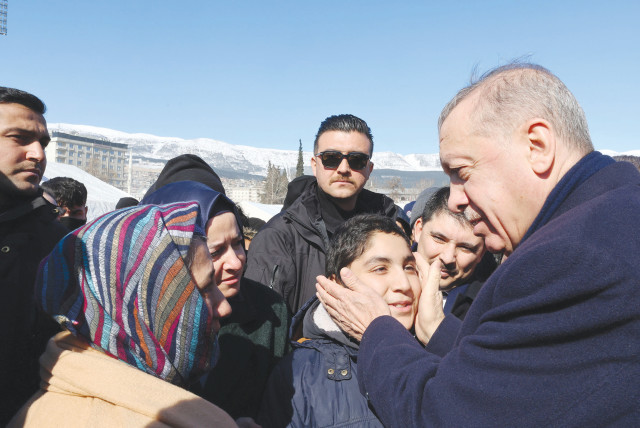Erdogan’s AKP relies on jingoism ahead of May 14 elections in Turkey

REGIONAL AFFAIRS: The AKP has started to pull out all the stops and is returning to its roots of extremism to win votes.
Turkey would appear to be at a crossroads. For the first time in many years, the opposition party looks like it might be able to actually challenge the ruling Justice and Development Party (AKP) in the upcoming election.
Polls have suggested the presidential and parliamentary elections held on May 14 will be close, with some surveys putting AKP leader and candidate Recep Tayyip Erdogan and his main challenger, Kemal Kılıçdaroglu, the head of the Republican People’s Party, within one or two percentage points of each other.
Kılıçdaroglu, the opposition candidate, is leading a charge for change in Ankara. However, he faces an uphill battle. The AKP has been in power for two decades, and it has become more authoritarian over the years. While Turkey still has elections, most of the media that are critical of the government have been silenced, and journalists have been imprisoned. In addition, tens of thousands of civil servants were imprisoned after a 2016 coup attempt, and people are often rounded up on trumped-up charges such as “terrorism” or “insulting” the government.
Even though members of the opposition parties often face sentences for merely critiquing the government, the ruling party is increasingly running a campaign based on xenophobia and extremism. This is the usual style for the ruling party. Whenever it senses its grip on power is weakening, it will turn to several well-known practices, such as claiming Ankara faces “terrorist” threats, and it needs to invade parts of Syria or Iraq; or it will gin up a conflict with Armenia, Greece or even Israel. These are the usual “enemies” of the state: Kurds, Greeks, Armenians or Jews, and any number of conspiracies can be trotted out against them.
For instance, Interior Minister Süleyman Soylu recently claimed that the elections themselves were an attempt by the West to have a “coup” in Turkey. This calls into question whether the ruling party will accept the election results or even allow free and fair elections to go forward in mid-May. While there may be an appearance of elections and voting, many countries know how to make sure that an actual free and fair election doesn’t happen. For instance, in the 20th century, Mexico’s longtime ruling party, the PRI, had elections but would often manipulate them. The fact that Ankara’s ruling party is already spreading rumors of a coup or Western conspiracy is similar to how former US president Donald Trump sought to undermine the election results in the US in 2020.
Turkey’s ruling party has appeared to stumble in the lead-up to the vote. Erdogan, who has dominated Ankara’s politics for two decades, appeared ill and tired for part of the campaign.
However, now the AKP has started to pull out all the stops and is returning to its roots of extremism and right-wing populism to win votes. In recent comments the AKP claimed that the opposition is pro-LGBT. The ruling party has often spread anti-gay rhetoric and attacked gay rights. In another incident Turkey closed its airspace to Armenia, after Armenia unveiled a monument in Yerevan. The anti-Armenian rhetoric and genocide denial regarding the Armenian genocide are also part of the usual repertoire of the ruling party.
TURKEY HAS an estimated 64 million registered voters. Around 3.4 million of them live abroad. Therefore, many Turkish citizens abroad have already begun voting. They’ve been voting since late April, and this will continue through mid-May. There are thought to be about 5% more registered voters than in the 2018 presidential election.
Turkey’s current election system is different from the previous system. Turkey used to be similar to Israel, with a prime minister as the more powerful figure. However, Ankara’s ruling party pushed through various reforms and changed the country into a presidential system after 2017. This centralized power around Erdogan and has turned Turkey into a country that is on the road to near-dictatorship.
Although the country still has opposition parties, it has long been dominated by one party and is one of the world’s largest jailers of journalists, so it is unclear whether the country can be defined as a free democracy. Ankara claims this is not the case and points to high voter turnout and other issues as an example of it being a democracy.
However, jailing opposition party members over “insults” to the ruling party and being one of the world’s largest jailers of journalists do not appear to be the norm in a democracy. The organization Freedom House downgraded Turkey to “not free” from partly free in 2018.
Turkish government invests largely in arms manufacturers ahead of elections
In the lead-up to the election, Turkey has burnished its credentials as a country that is changing. Turkey’s arms manufacturers are getting a huge investment from the ruling party. This is helped by the fact that the president’s son-in-law runs one of the country’s drone manufacturing companies.
One of the goals of the ruling party has been to make Turkey self-sufficient in terms of weapons manufacturing.
This means making its own armored vehicles and warplanes. Turkey unveiled combat drones and planes at a recent arms expo. Ankara knows it needs to build its own aircraft because its frequent threats against the EU, NATO and the US have meant that the US is unwilling to sell Turkey F-35s or F-16s.
Turkey is a member of NATO but in recent years has often worked against NATO’s policies, even preventing Sweden, a democracy, from joining the organization.
Ankara also has close ties with Russia and has acquired from it the S-400 air defense system. This has angered the US.
Turkey often uses its drones to carry out targeted killings of members of the US-backed Syrian Democratic Forces in Syria. During the Trump administration Ankara used its close ties to members of the administration to encourage the US to leave Syria. This led to several rounds of Turkish invasions of Syria and the movement of extremists to areas controlled by Ankara.
On the other hand Turkey is also angling to do a deal with the Syrian regime and possibly withdraw from Syria. Russia has wanted to broker this deal for several years.
Turkey recently claimed it neutralized a member of ISIS in a town called Jinderes in Afrin, a formerly Kurdish area now occupied by Turkey in Syria. This operation against ISIS in Syria is in contrast to previous incidents where Turkey appeared to create a safe haven for extremists, and the US often would carry out raids against ISIS in Turkish-controlled areas.
As the May 14 elections approach, it is not clear what rabbit the ruling party may pull out of its hat. It has a bag of dirty tricks it has used in the past, and it is likely to increase rhetoric against the West and against neighboring countries, to inflame tensions and get its base to vote AKP. Economic challenges and other issues nevertheless continue to be a challenge for the AKP.
Jerusalem Post Store
`; document.getElementById("linkPremium").innerHTML = cont; var divWithLink = document.getElementById("premium-link"); if (divWithLink !== null && divWithLink !== 'undefined') { divWithLink.style.border = "solid 1px #cb0f3e"; divWithLink.style.textAlign = "center"; divWithLink.style.marginBottom = "15px"; divWithLink.style.marginTop = "15px"; divWithLink.style.width = "100%"; divWithLink.style.backgroundColor = "#122952"; divWithLink.style.color = "#ffffff"; divWithLink.style.lineHeight = "1.5"; } } (function (v, i) { });

